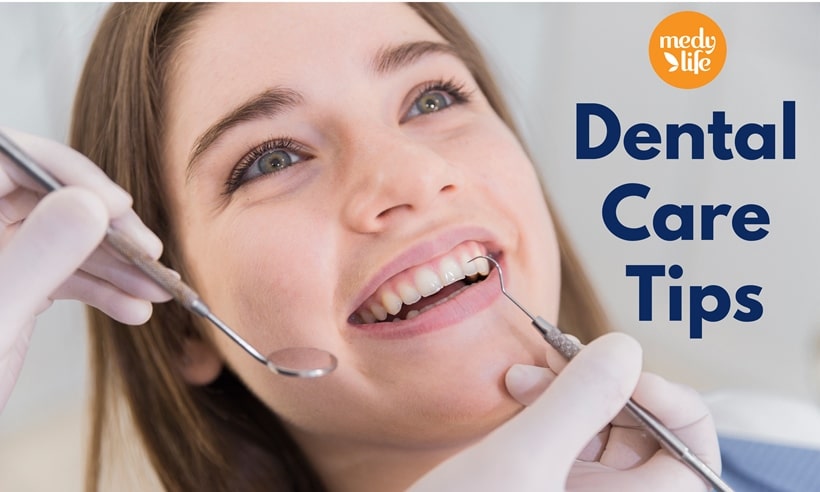
Dental Care Tips for Healthy and Glowing Teeth
10-07-2015 | Posted By: Admin | 5084 View(s)
The urge to have a healthy oral regime is something which everybody strives for but consciously or unconsciously is not aware of the facts that can contribute to a healthy oral hygiene. It is important to ensure that the oral health is good at all times especially when you happen to be working, as while working you need to interact with a lot of people and having a bad mouth odour will affect your social interactions. So it is very much desirable to have a healthy mouth odour and follow a healthy dental care regime.
What does Dental care or Good Oral Hygiene essentially Mean?
Good oral hygiene means that the mouth looks and smells healthy which essentially means that the mouth is free of bad breath odours, gums are healthy and do not hurt or bleed when you brush, or floss and the teeth are clean and free of debris at most of the times. As the saying goes prevention is better than cure- Taking care of your teeth and gums by proper brushing and flossing at least 2 times a day can help you in protecting your teeth and gums from problems which might arise as a consequence of not taking proper oral care or lead to complications if allowed to progress without any check.

The steps required to do the corrections at a later stage could not only be invasive & painful but worrisome and expensive too. So it makes all the more sense to take precautions at all times to ensure a good oral hygiene.
Here are some great Dental Care tips for proper dental care to ensure that your teeth and gums remain healthy so that you can avoid the cost of teeth implants and other expensive dental procedures.
Dental Care Tips to Keep Your Teeth Healthy & Glowing
1. Brushing Technique
Most people do not realize that there is a proper way to brush their teeth. You need to start by brushing the teeth at a 45-degree angle at the gums. The strokes should be short and go across the sides and the tops of the teeth. Next, turn the brush vertical and use even shorter strokes to focus on the backs of the teeth.
2. Flossing
Flossing is often overlooked but is equally crucial for oral hygiene. It helps remove food particles and plaque from between the teeth and along the gum line, where a toothbrush might not reach. Floss at least once a day, preferably before bedtime, using a gentle sawing motion.Flossing is just as important as brushing and must be done correctly. Use a piece of floss that is about 18 inches in length. This will allow you to use a fresh area of floss for every few teeth. Wrap the floss around each tooth in a “C” shape to remove bacteria that gets trapped there.

3. Mouthwash
Using an antimicrobial mouthwash can help kill bacteria and freshen your breath. It’s an excellent addition to your oral care routine but should not be used as a substitute for brushing and flossing.
4. Balanced Diet
A well-balanced diet not only benefits your overall health but also supports your dental health. Foods rich in calcium, such as dairy products, leafy greens, and nuts, promote strong teeth. Additionally, crunchy fruits and vegetables like apples and carrots can help clean teeth naturally.
5. Limit Sugary and Acidic Foods
Excessive consumption of sugary and acidic foods can lead to tooth decay and erosion of tooth enamel. Limit your intake of candies, sodas, and acidic fruits. When you do consume them, rinse your mouth with water afterward.

6. Stay Hydrated
Water is essential for overall health, including dental health. It helps maintain saliva production, which is crucial for washing away food particles, neutralizing acids, and preventing dry mouth.
7. Avoid Tobacco Products
Smoking and using tobacco products not only stain teeth and lead to bad breath, but they also significantly increase the risk of gum disease, oral cancer, and other serious dental issues. Quitting or avoiding these products is a significant step towards better oral health.
8. Protect Your Teeth
If you’re engaging in activities that could potentially damage your teeth (such as contact sports), it’s important to use protective gear like mouthguards. This helps prevent injuries that could lead to chipped or broken teeth.
9. Manage Stress
Stress can lead to teeth grinding or clenching, which can cause significant dental problems. Practice stress-reducing techniques such as deep breathing, meditation, or yoga to help protect your teeth from the negative effects of stress.
10. Replace Your Toothbrush Regularly
Toothbrushes wear out over time, and bristles become less effective at cleaning. Replace your toothbrush or toothbrush head every three to four months, or sooner if the bristles are frayed.
11. Address Dental Issues Promptly
If you experience any dental issues, such as tooth pain, sensitivity, or bleeding gums, it’s crucial to seek professional dental care promptly. Early intervention can prevent the problem from worsening and potentially save your teeth.
12. Practice Consistency and Patience
Achieving and maintaining good oral health requires consistent effort. It may take time to establish a routine and see improvements, but the long-term benefits are well worth the investment.
13. Regular Dental Check-ups
Regular dental check-ups are the cornerstone of good oral health. Visiting your dentist every six months allows for early detection and treatment of any potential issues, such as cavities, gum disease, or oral cancer. Your dentist can also provide professional cleanings to remove plaque and tartar buildup.
14. Brushing Enough
Regularly brushing is very important. However, most people do not brush for long enough. You should brush your teeth a minimum of two times each day for two minutes each time. Set a timer on your phone to help ensure you brush for long enough each time.

15.It’s All About the Brush
It is important to make sure that you are choosing the right toothbrush to use. Choose one that has small bristles and a small head so that it can reach into the crevices of the teeth in the back as this is where food particles tend to hide. A small or medium toothbrush is recommended. Choose the right toothbrush to keep your teeth healthy.
16. Keep your Toothbrush Clean
Do not keep your brush covered as this can actually cause bacteria to grow on it. Instead, make sure that you rinse your brush well after brushing and then allow it to air dry.
17. Tongue Scrapers
There are some toothbrushes that are designed with a tooth scraper on the back. After you brush bacteria may remain on the tongue. Using a tongue scraper or brushing your tongue can help to rid the mouth of the bacteria
18. Quit Snacking
Do you often eat before going to bed? If you tend to snack late in the evening, make sure that you are brushing after you do so. If you brush and then have a snack, the food particles will remain on the teeth and can cause fuel for bacteria to grow.
When it comes to oral hygiene, most people are simply not doing enough. The majority of individuals think that brushing twice each day and flossing a few times a week is all they need to do to keep their teeth and gums healthy. While this is a good start, there are a few other things that you can do to ensure good oral health.
Tips for Using the Right Toothbrush
When it comes to selecting the right hairbrush or a make-up brush, we give far more attention than when it comes to choosing the right toothbrush. But a wrong brush, as well as mistaken style of brushing, can do lots of harm to your teeth. It can fail to clean up the plaque- thus leading to tooth decay in a lot of cases. The following 3 points will enlighten you about how to go ahead with the purchase and use the ideal toothbrush for yourself.

• Use Small Brush Head and Handy Bristles:
Do you feel pain on your jaws every time you brush your teeth? Does your brush fail to reach out to the corners of your mouth? Then it’s time to invest upon a new toothbrush that flaunts efficient shape and design. The brush head has to be small enough so that you can put it in your mouth easily. Not only that, the bristles should be designed in such a way that they can reach out to the tight spots that are hard to clean up otherwise. Small is beautiful when it comes to the toothbrush head. A quick tour of the oral care section of your local supermarket will provide you with multiple options.
• Lean on Soft Bristles:
Though there are hard as well as medium-hard bristled toothbrushes available in the market, you must zero upon on the one- that has soft bristles. In this way, you can ensure proper and gentle care of your teeth and gum. So point to remember: no matter what you read up in the magazines about the benefits of hard bristles on a toothbrush, always go for soft ones.
• The Toothbrush handle has to be tight and non-slippery to hold:
Your brush handle must provide you with a tight, non-slippery grip- so that you can twist it without any fear. So after brush head and bristles, the handle is the most important aspect to look for in an ideal toothbrush. People hold the toothbrushes in 5 separate ways. Oral-B is one manufacturer that has designed its brushes based on this fact.
Do keep it in mind, even the best toothbrush will also stop performing after a point of time. So don’t forget to replace the toothbrush every three months. A replaced brush can eradicate plaque up to 30% more than the previous one. Also, a multi-angled toothbrush proves much useful when it comes to removing plaque.
4. ADA Approved Toothpastes
When it comes to toothpaste, not everyone is created equally. In order to get the best clean possible, choose a toothpaste that has the ADA seal of approval. These kinds of toothpaste meet the strict regulations set by the ADA.
More Handy Tips Home for Dental Care
1.Brush and Floss at least two times a day after having the meals.
2. Rinsing makes you free from bad breath especially after having onions etc.which have a strong odour.
3.Balanced Diet and limit snacks in-between meals.
4. Limit the intake of Beverages like tea or coffee.
5. Tobacco and Tobacco products should be avoided at all costs. Smoking should be a big taboo.
6. Brushing should be done gently and in the right manner. Using too much force while brushing leads to the creation of pressure points which become vulnerable at later stages of life.
7. In case you happen to live in a non-fluoridated area-Make sure that the children under 12 drink fluoridated water or take a fluoride supplement.
8. Drink plenty of water at least 8 to 10 glasses on a daily basis.
9. Chewing gum improves breath odour, increases saliva, which is the most important component of oral health and the powerful protector of the oral cavity.
Oral hygiene is important for your overall health. If you follow the above Dental Care Tips, choose the top products, work on your technique, and make sure that you are doing everything that you can to keep your mouth clean, you are on your way to good oral health


